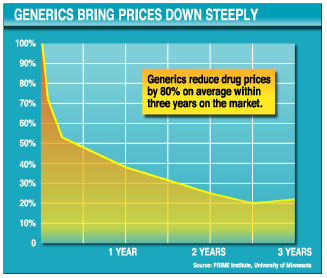|
|
| |
 | ||||||||||||||||||||||||||||
|
|
Second in a Series: The High Cost of
Drugs…
Brands vs. Generics
National concern over soaring prescription drug prices has recently cast a spotlight on the use of generic drugs to save money and on various drug industry practices that critics say keep generics off the market as long as possible. In fact, some lawmakers are now touting generics—less costly and less promoted than brand-name drugs—as a way to ease the troubled path to a Medicare drug benefit. House Republicans drafting a new benefit proposal are considering lower copayments for patients who choose generics, a practice increasingly used in private health plans to keep costs down.
Up to $10 billion a year could be shaved from the cost of a benefit in this way, according to a recent study from Brandeis University. "How can we get more bang for our buck? The number one answer, as this study shows, is generics," Sen. Charles Schumer, D-N.Y., told reporters. Promoting generics through incentives and education could bring down overall costs without imposing price controls on drugs, which the industry has always resisted. GIVING GENERICS A BREAK The brand-name industry fiercely opposes such moves. But the National Governors Association, citing the impact of drug costs on state Medicaid budgets, has urged Congress to "fully review" the law. Generics are "copycat" drugs that become available when patents held by brand-name companies expire. They are less costly because generic drugmakers do not have to recoup the costs of research and development. The Food and Drug Administration (FDA) must approve the copies, ensuring they work the same way medically as the original drugs. When generics enter the market, prices drop dramatically, falling on average to less than 50 percent of the brand-name price after six months and to about 20 percent within three years. (Brand-name prices tend to remain high, experts say, as companies rely on promotions to maintain brand loyalty.) 
Patents on about 17 brand-name medicines are due to expire in the next five years, including blockbusters Prevacid (for ulcers), Zocor and Pravachol (for cholesterol) and Zoloft and Paxil (for depression). Each of these generates sales of $1 billion to $3 billion a year. A key issue, though, is how soon generics can come to market. The 1984 Hatch-Waxman Act speeded up that process to increase generic competition, while allowing brand-name companies longer patent protection to encourage research and innovation. But Rep. Henry Waxman, D-Calif., who co-authored the act with Sen. Orrin Hatch, R-Utah, now says: "The pharmaceutical companies under this law have looked for every loophole they could possibly find to keep generics off the market." Schumer and Sen. John McCain, R-Ariz., are cosponsoring a bill to close these perceived loopholes. Waxman supports it but adds: "I always fear that if we open up Hatch-Waxman [to any changes], the brand-name companies would try to grab more for themselves."
|
|||||||||||||||||||||||||||